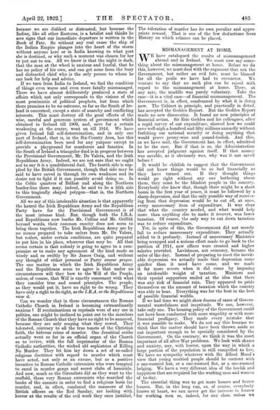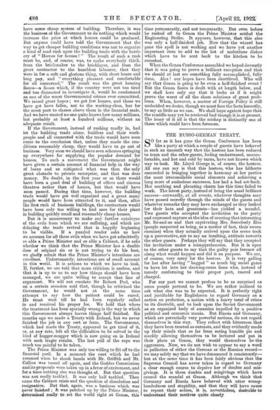MISMANAGEMENT AT HOME.
liVE have catalogued the results of mismanagement abroad and in Ireland. We must now say some- thing about the mismanagement at home. Before we do this, however, we must deal with the argument that not the Government, but rather an evil fate, must be blamed for all the perils we have had to encounter. We venture to say that no such plea can be raised with regard to the mismanagement at home. There, at any rate, the muddle was purely voluntary. Take the case—it is a vital case—of financial mismanagement. The Government is, in effect, condemned by what it is doing now. The Cabinet in principle, and practically in detail, has accepted the Geddes Report. But the Geddes Report made no new discoveries. It found no new principles of financial action. Sir Eric Geddes and his colleagues, after a rapid survey of our expenditure, showed how we could save well-nigh a hundred and fifty millions annually without forfeiting our national security or doing anything that would prove penny-wise and pound-foolish. And this, as we have said, the Government has, in effect, admitted to be the case. But if that is so, the Administration has accepted judgment against itself. If that money was savable, as it obviously was, why was it not saved before ?
It would be childish to suggest that the Government did not know things would be so bad financially as they have turned out. If they thought things would go right without any one bothering about them, they must be the blindest people in the country. Everybody else knew that, though there might be a short boom in the first year of peace, it must be followed by a sharp depression, and that the only possible way of recover- ing from that depression would be to cut off, at once, every unnecessary item of expenditure. It was clear that what the country needed, and what would help more than anything else to make it recover, was lower taxation. Of course, the only way to cut down taxation was to reduce expenditure. Yet, in spite of this, the Government did not merely fail to reduce unnecessary expenditure. They actually added to it profusely. Instead of unnecessary Ministries being scrapped and a serious effort made to go back to the position of 1914, new offices were created and higher salaries provided. Lavishness, not economy, became the order of the day. Instead of preparing to meet the inevit- able depression we actually made that depression come quicker than it need have come, and we made it far more severe when it did come by imposing an intolerable weight of taxation. Ministers and their special supporters smiled at the idea that there was any risk of financial ruin. They appeared to pride themselves on the amount of taxation which the country was able to bear. Everything was for the best in the best of possible financial worlds. If we had time we might show dozens of cases of Govern- mental wastefulness and ineptitude. We can, however, take only one. The housing policy of the Government could not have been conducted with more stupidity or with more financial profligacy. They made every mistake that it was possible to make. We do not say this because we think that the matter should have been thrown aside as not important enough to be specially considered by the Government. On the contrary, we think it was the most important of all after-War problems. We look with shame and anxiety, nay, with horror, upon the way in which a large portion of the population is still compelled to live. We have no sympathy whatever with Sir Alfred Mond's view that young married people should be content with a one-roomed hut, or a one-roomed fiat, or a one-roomed lodging. We have a very different idea of the health and happiness that are required for the working men and women of to-day. The essential thing was to get more houses and better houses. But, in the long run, as, of course, everybody knows at heart, we can never get the increase in houses for working men or, indeed, for any class, unless we have some ()heap system of building. Therefore, it was the business of the Government to do nothing which would increase the price at which houses could be produced. But anyone could have told the Government that the way to get cheaper building conditions was not to organize a kind of mad rush upon the building trade With the battle cry of " Homes for heroes ! " The result of such a rush must be, and, of course; was, to make everybody think, from the brickmaker to the bricklayer, and from the great contractor to the humblest labourer, that they were in for a soft and glorious thing, with short hours and long pay, and " everything pleasant and comfortable for all concerned." The result was the great housing fiasco—a fiasco which, if the country were not too tired and too distracted to investigate it, would be condemned as one of the worst Governmental crimes ever committed. We raised great hopes ; we got few houses, and those we have got have fallen, not to the working-class, but for the most part' to classes above them in the financial scale. And we have wasted no' one quite knows how many millions, but probably at least a hundred millions, without an adequate result.
If the Government, instead of rushing madly in, had let the building trade alone, builders and their work- people and all connected with the trade would have soon come to the conclusion that, unless they made the Ctsi- ditions reasonably cheap; they would have to go out of business. Very soon we should have seen schemes springing up everywhere for' aripplying the popular demand for houses. To such a movement the Government might have given a certain amount of financial help in the way of loans and so mitigated what was then the only great obstacle to private enterprise, and that was dear money. No doubt, in the first year or so there would have been a good deal' of building of offices and cinema theatres rather than of homes, but that would have soon passed. During that time, however, the building trade would have got Well organized and a great many people would have been attracted to it, and then, after the first rush: of business buildings, the contractors' would have been only too- willing to find uses for their plant is building quickly small an reasonably cheap houses.
But- it ie unnecessary. to make any further catalogue of the evils from which we are suffering, and which are delaying the trade revival that is happily beginning to be visible. If a puzzled reader asks us how *e account for all these evils when we have got admittedly so able a Prime Minister and so able a Cabinet, if he asks whether We think that the Prime Minister has a double dose of original sin or is not trying to do his best, we gladly admit that the Prime Minister's intentions are excellent. Unfortunately, intentions are of small account in this world. It is actions to which we have' to look. If, further, we are told that mere criticism is useless, and that it is up to us to say how things should have been managed, we are quite willing to accept that line' of argument. We will not emulate Sir Robert Peel, who on a certain occasion said that, though he criticized the Government, he would- not at the same time attempt to say how the patient could be cured. He must wait till he had been regularly called in and received his proper fee. We hold that where the treatment has been specially wrong is the way in which this Government always leaves things half finished. Six months- ago we made a Treaty with Ireland, but we never finished the job in any sort or form. The Government, which had made the Treaty, appeared to get tired of it, or, at any rate, left all the difficulties to be solved in the kind of hugger-mugger which is now going on in Ireland with such tragic results. The last pull of the rope was much too painful to be' taken.
The Prime Minister was only too willing to flit off to the financial peril. In a moment the coat which he had resumed when he shook hands with Mr. Griffith and Mr. Collins was tossed off again, and the Geddes Commission and its proposals were taken up in a fever of excitement, and for a time nothing else was thought of. But that question was not really tackled. It was only half tackled. Then came the Cabinet crisis and the question of dissolution and resignation. But that, again, was a business which was never finished ; ft was patched up by the Prime Minister, determined really to set the world right at Genoa, this time permanently, and not temporarily. But even before' he rushed off to Genoa the Prime Minister settled the' Engineering Strike. It appears, however, that this also was only a half-finished job. Now that the wizard has gone the spell is not working and we have yet another important item to add to the list of underdone dishes which have to be sent back to the kitchen to be recooked.
When the Genoa Conference assembled we hoped devoutly that it was going to prove a brilliant exception and that we should at last see something fully accomplished, fully done. Alas ! our hopes have been shortlived. Who will- say that Genoa is going to be even a half-finished event ? But the Genoa fiasco is dealt with at length below, and we shall here only say that it looks• at if it might probe- the worst of all the sham solutions of great prob- lems. When, however, a matter of Foreign Policy is still undecided we desire, though we must face the facts honestly, -to say as little as we can. We shall' hope against hope that the muddle may yet be retrieved bad though it is at present. The irony of it all is that the mishap is distinctly one of those which could have been foreseen.



































 Previous page
Previous page